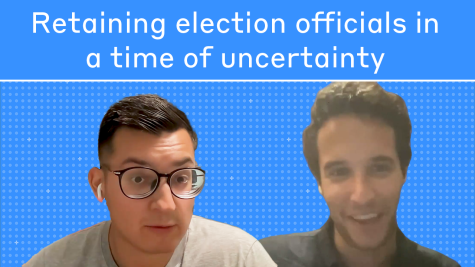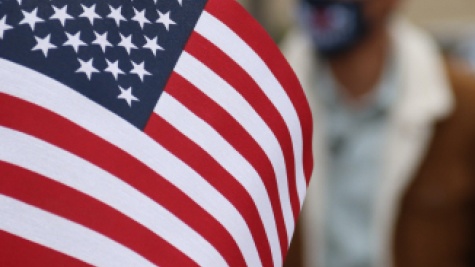Opting Out? Recent Challenges in Recruiting and Retaining Poll Workers
An update on ongoing research seeking to fill a void in knowledge about the poll workers by surveying them directly.
The MIT Election Data and Science Lab helps highlight new research and interesting ideas in election science, including through research grants under our ongoing Learning from Elections program.
Our post today was written by Barry Burden and Robert Stein, based on their ongoing research funded by this program. The information and opinions expressed in this column represent their own research, and do not necessarily represent the opinions of the MIT Election Lab or MIT.
In a typical November general election in the United States, hundreds of thousands of Americans volunteer to serve as poll workers. Because they handle tasks such as checking in voters, setting up voting machines, and managing lines, these frontline volunteers are essential to the conduct of a successful election.
Yet poll workers were not given much public attention until 2020. In that election the difficultly of the job ratcheted up significantly because of three factors: health concerns arising from the coronavirus pandemic, election disinformation and misinformation, and harassment of and threats to election workers themselves. In the face of these unpleasantries, many veteran poll workers decided not to serve. As a result, election local officials scrambled to recruit new poll workers, using incentives such as higher pay to attract a new cohort of volunteers.
This quickly evolving environment revealed how little is known about the recruitment and retention of poll workers. Several helpful local studies of poll workers and regular survey data from the EAC on the ages of and reported difficulty of acquiring poll workers provide clues, but mostly from other people’s perspective. They stop short of understanding the motivations for continuing to serve after a difficult election experience.
We sought to fill a void in knowledge about the poll workers by surveying them directly. Working with 13 collaborators at colleges and universities around the U.S. in partnership with their local election officials, we fielded surveys of thousands of poll workers. Identical questions were asked of poll workers in a variety of jurisdictions across the country ranging from Charleston, South Carolina to Milwaukee, Wisconsin to explore how local conditions affect poll worker experiences. We fielded a first wave before the November 2022 elections that went to anyone who had served in elections going back to 2020. A follow-up survey after the November 2022 elections targeted only those who served in that election cycle.
In the post-2020 environment, we were particularly interested in what motivates people to serve as poll workers, how they are navigating changes in state election practices, and how they responding to new challenges such as aggressive poll watchers.
The surveys probe four main aspects of poll worker experiences:
- poll workers’ interactions with the public, including such things as whether voters were courteous and whether poll workers felt safe and sufficient compensated for their time
- convenience and adequacy of training to do the job
- whether relationships with fellow election workers were punctual, collaborative, and professional
- problems the poll worker observed, including voter difficulties using election equipment and conflicts among voters.
About 30% of individuals who served as poll workers in 2020 indicated they would not be likely to do so in 2022. Many people reported in this camp told us the reasons were simply being too busy or the inconvenience of the times and places to wore. But 15% responded that concerns about conflicts at the polls and partisan poll watches were the reasons for opting out.
Individuals who indicated they were likely to continue working the polls in 2022 tended to be older, had more experience, and reported more positive collaborations with other poll workers in prior elections. Those unlikely to continue reported more problems working the polls in 2020 and were more likely to express concern about conflicts at the polls. Indeed, preliminary multivariate analysis showed that having a bad experience in 2020 was the most important factor leading people to discontinue their service as poll workers.
As we analyze the data over the coming months, we plan to initiate another round of poll worker surveys in 2024 covering a wider array of jurisdictions around the country. That in turn will allow to explore some crucial questions that are a real practical importance to local election officials. What factors explain the successful recruitment and retention of highly competent poll workers? How much do changes in state laws and practices either encourage or discourage serving? This could include compensation for poll workers but also whether legal protections for poll workers and transparency initiatives such as audits and recounts provide more insurance to serve.
Having been thrust into the spotlight as a result of suspicion and animosity toward aspects of election administration since the 2020 presidential election, poll workers now operate in a new political and administrative environment that we hope our project can illuminate to answer scholarly questions about election workers and provide practical guidance to the election officials who depend on them.



